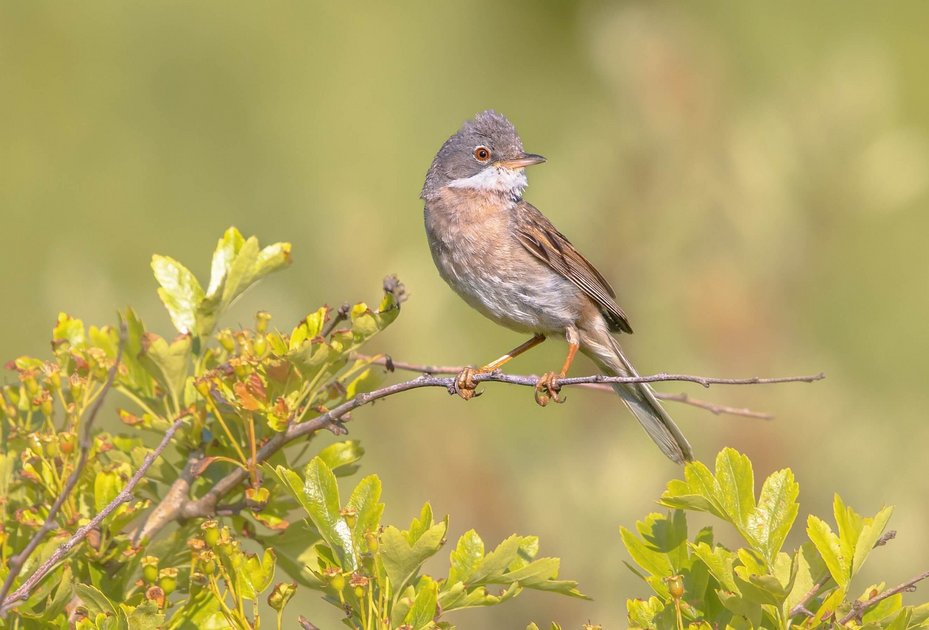- Home /
- University /
- Infoservice /
- Press Releases /
- Weather Conditions do not affect stress hormones in migratory birds after crossing the mediterranean
Research
Weather Conditions do not affect stress hormones in migratory birds after crossing the mediterranean
A new study led by Vetmeduni shows that migratory birds are remarkably well-adapted to the challenges of long flights across the Mediterranean. Even under variable weather conditions, their stress hormone levels remain stable, indicating that they are physiologically well-prepared for these hardships.

The researchers studied two migratory bird species – the Garden Warbler (Sylvia borin) and the Whitethroat (Curruca communis) – during their spring migration. The birds were captured on the Italian island of Ponza after crossing the Mediterranean. The researchers analyzed the concentration of the stress hormone corticosterone (CORT) in the birds' blood, both at rest and under stress conditions.
"It is fascinating to see how well these small birds are prepared for the challenges of their journey. Their ability to maintain a stable stress response even under difficult weather conditions shows how adaptable they are," says lead author Erica Calabretta from the Konrad Lorenz Institute of Comparative Ethology (KLIVV) at Vetmeduni.
Findings on Weather Resilience
The study's findings are surprising: neither wind conditions nor temperatures during the flight affected the baseline levels of the stress hormone. Even with moderate headwinds or cooler temperatures, the birds showed no increased stress reactions. "We had expected adverse weather conditions to increase stress hormone levels, but that was not the case," adds Calabretta.
Strategic Decisions and Adaptability
According to the researchers, birds that successfully reached their destination had sufficient energy and fat reserves and were in good to excellent physical conditions. The study highlights that these birds strategically choose their departure time and condition to successfully cross the Mediterranean. "These birds are true masters of planning," says study senior author Leonida Fusani, head of KLIVV. "They wait for the best conditions before starting their journey and manage their energy well – and it pays off." However, these findings only apply to birds that successfully completed the crossing. "We don’t know how many birds fail to finish the journey," notes Calabretta. "This is an important question that we need to investigate in future studies."
The Mediterranean region has experienced an increase in unpredictable weather events in recent decades, underscoring the importance of this research. "Extreme weather conditions could deplete the birds' energy reserves and impair their ability to cope with stress factors such as predators," says Ivan Maggini from KLIVV.
The research demonstrates how adaptable migratory birds are, but it remains unclear how they would respond to more extreme weather conditions. "We need to better understand the physiological mechanisms that enable these birds to overcome such challenges," says Fusani. The findings aim to improve the protection of migratory birds, especially in the face of climate change.
The article “Passerine stopover physiology: weather variability does not alter corticosterone dynamics after sea crossing” by Erica Calabretta, Virginie Canoine, Massimiliano Cardinale, Ivan Maggini and Leonida Fusani was published in the Journal of Avian Biology.
Scientific article
Scientific contacts:
Univ.-Prof. Leonida Fusani
Konrad-Lorenz-Institut für Vergleichende Verhaltensforschung (KLIVV)
Veterinärmedizinische Universität Wien (Vetmeduni)
Leonida.Fusani@vetmeduni.ac.at
Erica Calabretta MSc.
Konrad-Lorenz-Institut für Vergleichende Verhaltensforschung (KLIVV)
Veterinärmedizinische Universität Wien (Vetmeduni)
Erica.Calabretta@vetmeduni.ac.at
Dr.rer.nat. Ivan Maggini
Konrad-Lorenz-Institut für Vergleichende Verhaltensforschung (KLIVV)
Veterinärmedizinische Universität Wien (Vetmeduni)
Ivan.Maggini@vetmeduni.ac.at